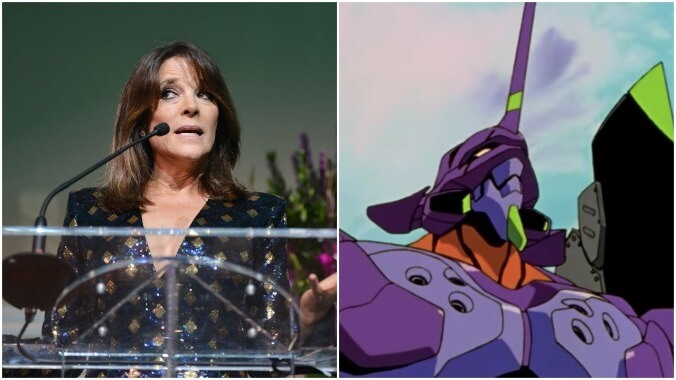Marianne Williamson's new campaign strategy: critical reads of Neon Genesis Evangelion

[Spoilers for Neon Genesis Evangelion.]
Say what you will about author and activist Marianne Williamson’s nebulous, psycho-spiritualist platform and the value of her self-help-y approach to reforming the deeply broken state of modern American politics, but she sure does run an entertaining campaign. After making an incredibly memorable entrance to the 2019 political landscape with her performance at the Democratic debates at the end of June, Williamson’s unique brand of delirious, government-flavored pep talk has inspired everything from Kate McKinnon impressions to quizzes pitting her quotes against some of the dizziest lines from the Metal Gear Solid video game series.
It’s only natural, having seen which way the wind is blowing, that Williamson has leaned into this side of her fame. And thank god she’s doing it by officially recognizing a meme that combines her words with the post-apocalyptic horror of classic anime Neon Genesis Evangelion.
Williamson posted the above macro showing Evangelion’s secretly insecure, deeply traumatized loudmouth pilot Asuka Langley Soryu sitting in the cockpit of her blood-drenched battle mech paired with one of one of the author’s innumerable aphorisms: “Value does not derive from labor; it derives from self actualization. Everything we do to help people express themselves at a higher levels puts value into the economy.”
“I don’t know who created this meme, but it’s wonderful,” her post reads. “Those are indeed my words, and I think people turning them into cartoon memes is utterly fascinating. What a way for the mind to process something.”
On the surface, it looks like Williamson is simply using the meme, created by the aptly named “Marianne Williamson quotes over pictures of Neon Genesis Evangelion” Facebook group, as an excuse to defend her one-of-a-kind style of politicking. But look a bit deeper and it becomes clear that she’s actually partaking in serious artistic criticism, likely in an effort to court the coveted anime vote. “The biggest problem in the world is that we do not show up for another,” she writes, echoing the depressive alienation that serves as Evangelion’s most important theme. “We withdraw in judgement rather than extending ourselves into each other’s lives,” it goes on, clearly evoking the “Hedgehog’s Dilemma,” which concerns the difficulties in intimacy discussed by Schopenhauer and Freud, and used by characters in the show to describe the psychology of the tortured young Shinji Ikari.
Her thoughts on the Human Instrumentality Project that ends Evangelion by forcing humanity to psychically merge into a single consciousness is clear when Williamson writes that “there is literally nothing we could not achieve were we willing to join with each other at deeper levels.”
Agreeing with the shadowy figures who run SEELE, Williamson adds: “Humanity will literally not be able to survive itself, if we do not awaken to our oneness and come to the realization that in love and love alone are we at home.”
That she, like Evangelion itself, ends her message with a #bigtruth is no coincidence. Williamson has obviously watched the series and seen in it not just an entertaining and provocative treatise on mental health, the difficulty of life in modern society, and the existential terror of the human condition, but a text worth publicly engaging with on the road to her destiny as the next President Of The United States Of America—or the next director of NERV. Whatever comes first.
Send Great Job, Internet tips to [email protected]